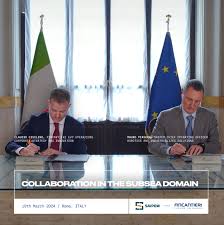Fincantieri, the only shipbuilding group in the world active in all high-tech marine industry sectors, and Saipem, global leader in the engineering and construction of infrastructure for the energy sector, both offshore and onshore, have signed a Memorandum of Understanding (MoU) to evaluate commercial and industrial opportunities for cooperation in the field of autonomous subsea vehicles and their integration with surface and underwater units.
The Memorandum, signed at Palazzo Marina, the headquarters of the General Staff of the Italian Navy, is among the initiatives aimed at promoting and developing national excellence in the Underwater sector.
The agreement aims to enable the two companies to participate in major programmes in the Italian and international markets in the area of surveillance and control of critical underwater infrastructure and rescue activities, through the use of specific complementary technologies from Fincantieri and Saipem.
The collaboration involves the integration of surface vessels and submarines built by Fincantieri with the drone development programme “Hydrone” developed by Sonsub, Saipem’s centre of excellence for subsea technologies and solutions.
Saipem is in fact the first company in the world to have qualified and commercialised resident autonomous subsea drones for intervention and inspection activities at depths of up to 3,000 m.
Designed and industrialised between Marghera (Venice) and Trieste, they have already been deployed for the control and maintenance of underwater infrastructure in the offshore energy market at the service of major energy companies.
Fincantieri has placed itself at the centre of development programmes in the Underwater sector, with extremely promising business opportunities, also thanks to its ability to guide an effective integration between the Defence and civil industries.
Since 1929, the Group has built 180 submarines, 105 of which at the Muggiano shipyard.
By signing the MoU, Fincantieri and Saipem aim to become a key reference for the subsea domain, whose strategic relevance is becoming increasingly evident in the current geopolitical context.





